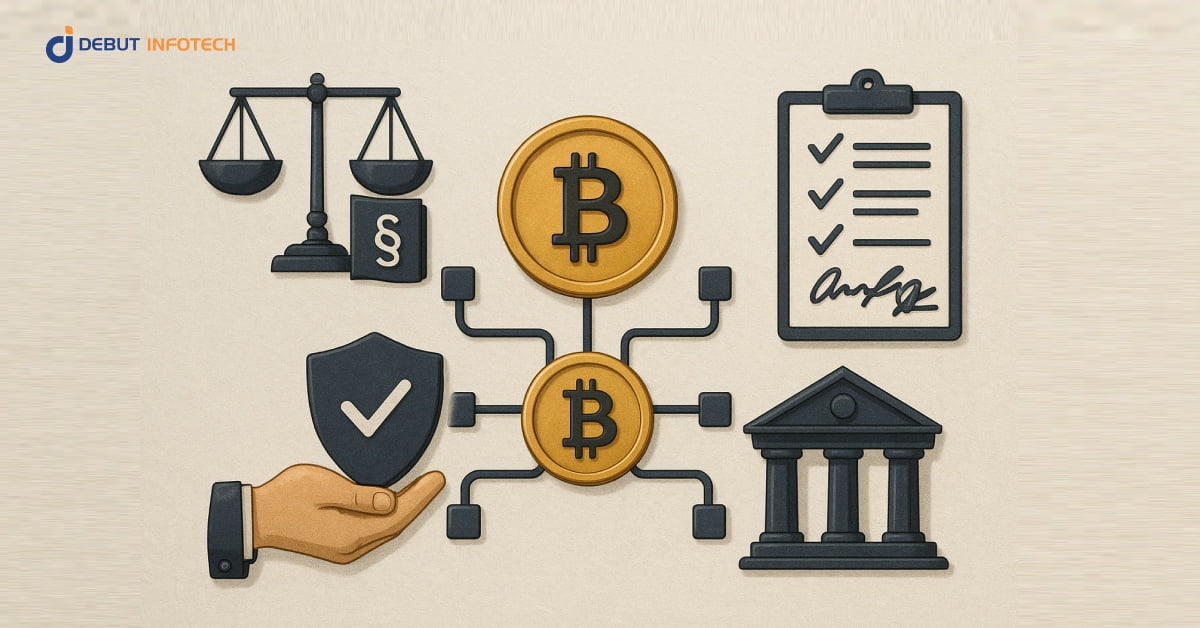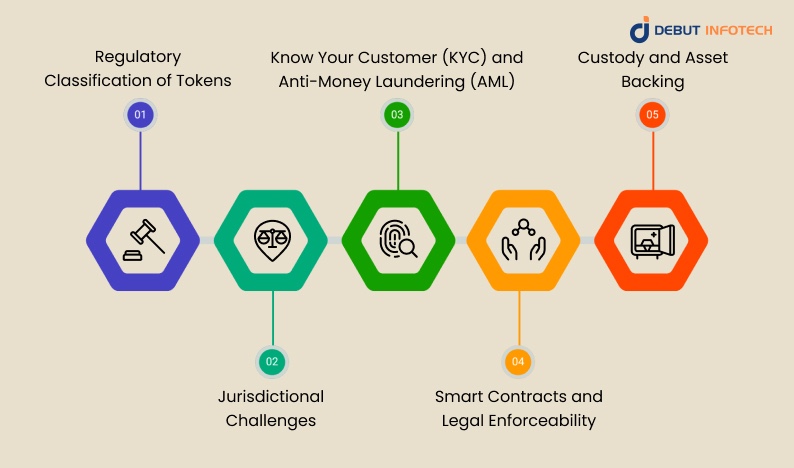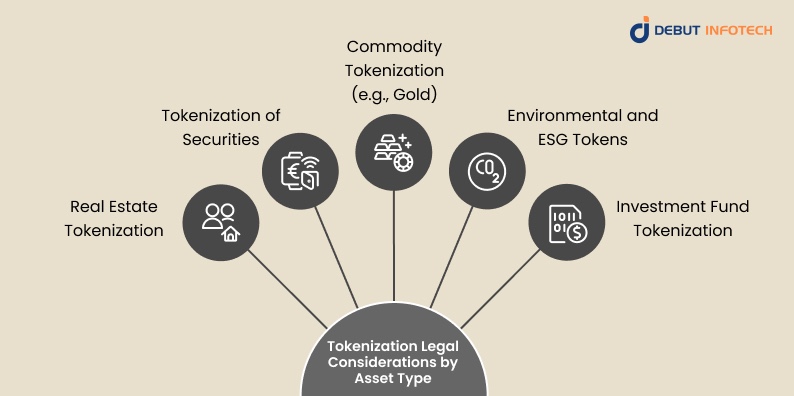Table of Contents
Home / Blog / Tokenization
Understanding Tokenization Legal Considerations in Asset Regulation
July 15, 2025

July 15, 2025
Blockchain technology is advancing and spreading into various industries. There is a need to introduce a groundbreaking way to tokenize physical and non-physical properties, and that is developments in tokenization. Nonetheless, the hype due to this innovation should be balanced with intricate legal systems that revolve around it. Regulations that should be followed under the process of tokenization legal considerations have suddenly become the main focus of the company, regulators, and investors since jurisdictions are scrambling to update their regulatory framework due to the dynamic digital environment.
From tokenization of securities to real estate tokenization platforms, the legal landscape varies widely depending on asset class, region, and the type of token issued. This article explores the essential tokenization legal considerations in asset regulation, focusing on compliance obligations, regulatory categorization, jurisdictional challenges, and the legal nuances that companies must understand before diving into this space. Whether you’re an investor, a startup, or part of a real estate tokenization company, grasping these legal foundations is crucial for navigating this evolving ecosystem.
Launch Legally-Compliant Tokenized Assets with Confidence
Planning to tokenize real estate, securities, or investment funds? Debut Infotech helps you navigate every legal and technical challenge—from smart contracts to full compliance.
What is Asset Tokenization?
Asset tokenization refers to converting the ownership or economic activity right to a real-world or digital asset into a blockchain-based token. A token is a digital representation of an asset, be it physical or non-physical, that can be traded, transferred, or split between various stakeholders in a secure, immutable, and transparent state.
The process has become popular worldwide as an improved method of owning and transferring assets instead of being utilized within traditional ownership and transfer of assets systems. Tokenization with blockchain helps eliminate numerous friction points inherent in legacy systems, including restricted market access, excessive administrative expenses, and ineffective clearing and settlement mechanisms.
Tokens can represent a wide range of asset types, including but not limited to:
- Real Estate: Residential or commercial property rights, fractional building ownership, or rental income streams.
- Precious Metals (e.g., Gold): Digitally backed reserves of gold or silver held in secured storage.
- Commodities: Agricultural products, oil, or raw materials, tokenized for easier trade and settlement.
- Equity Shares: Private or public shares tokenized for easier trading, fundraising, or investor access.
- Bonds and Securities: Debt instruments digitized to improve liquidity, transparency, and investor reach.
- Carbon Credits: Credit carbon tokenization allows companies to trade carbon offsets in digital form on open markets.
- Intellectual Property Rights: Patents, copyrights, or digital creations tokenized for licensing or royalty distribution.
- Payment Instruments: Vouchers, digital currencies, or fiat-backed stablecoins used in payment tokenization systems.
- Investment Funds: Fund tokenization involves digitizing mutual funds, ETFs, or hedge fund shares to simplify management and access.
Tokenization transforms traditionally illiquid assets into divisible, transferable tokens, enabling fractional ownership and broader investor access. However, despite its benefits, careful attention to tokenization legal considerations is essential, as specific regulations govern each asset type. Missteps in classification or compliance can lead to serious legal consequences, making regulatory awareness vital, especially in areas like the tokenization of securities and real estate tokenization platforms.
Related Read: Asset Tokenization Trends
Types of Tokenized Assets and Their Legal Implications
To fully understand tokenization legal considerations, it’s essential to begin with the nature of the asset being tokenized. Not all assets are treated equally under the law. Different categories of tokenized assets are subject to varying legal frameworks, compliance requirements, and regulatory oversight, especially across different jurisdictions. Below is a closer look at common asset classes and the unique legal implications each one carries when tokenized.
Securities
Among the most regulated elements of tokenization is the sphere of securities, such as stocks, bonds, derivatives, and other financial assets. Once tokenized, these assets are strictly subject to securities law, forcing projects to comply with heavy regulatory standards. This often entails Know Your Customer (KYC) checks, Anti-Money Laundering (AML), qualifying requirements for investment by an investor, registration of the issuing body, and disclosure requirements. Failing to recognize a security token as a utility may lead to severe legal issues, such as financial penalties or sanctions from the corresponding regulatory bodies.
Real Estate
Tokenization of real estate has created the prospect of fragmentary ownership of houses and commercial buildings. Nevertheless, real estate is tied to a local legal system, and tokenizing real estate exposes regulatory problems. Legal implications encompass confirmation of ownership by using property title lists, giving rights of token holders to appropriate land registries, and providing adequate legal mechanisms for income distributions and transfer of possession of assets. Depending on the jurisdiction, property transfer taxes, zoning regulations, and foreign ownership references will have to be addressed.
Precious Metals
Precious metals like gold or silver can also be tokenized, and investors will then have a digital asset backed by a physical commodity. Yet, to become legally compliant, these assets may demand evidence of reserve, third-party audits, and tight custody provisions. Issuers of tokens should also ensure that behind every token is full backing in a vault in a ratio of 1:1 in terms of the metal, which can be done through open audit reports. Secondly, some jurisdictions may also regulate the treatment of tokenized commodities as a commodity brokerage needing corresponding licenses or compliance with commodities trading regulations.
Carbon Credits
The tokenization of carbon credits—called credit carbon tokenization—is growing in response to sustainability goals and ESG investments. However, environmental regulators typically govern carbon credits, and their legal use is often limited to approved offset markets. Legal considerations here include verifying the legitimacy of carbon offset sources, ensuring tokens are not double-counted across registries, and meeting reporting standards for corporate emissions accountability. Some regions may also restrict who can buy, sell, or retire these tokens.
Investment Funds
Fund tokenization involves turning shares in mutual funds, hedge funds, or other pooled investment vehicles into digital tokens that investors can trade or hold. This area intersects deeply with securities regulation. Tokenized funds must be registered or exempt under applicable laws, and fund managers are often required to hold investment advisory licenses. Investor disclosures, fund performance reports, and regulatory filings must be maintained in both traditional and digital formats to ensure legal compliance. Furthermore, the token’s smart contract must clearly codify liquidity rules and redemption rights.
Equity
Equity tokenization refers to digitizing a company’s ownership shares. These tokens carry the same rights and obligations as traditional equity, such as voting rights, dividends, and capital gains participation. As with securities, equity tokens are usually subject to regulation by financial authorities and corporate governance laws. Issuers must ensure that shareholder rights are clearly defined and that equity transfers are recorded in a legally recognized share ledger. Tokenized equity often appeals to startups seeking alternative fundraising methods, but it requires careful legal structuring to avoid violating securities laws.
Related Read: Equity Tokenization vs. Traditional Methods
Key Legal Considerations in Asset Tokenization

Let’s explore the critical legal factors that impact the tokenization of assets:
1. Regulatory Classification of Tokens
The first and most essential legal question is: What type of token is being issued?
Tokens are generally categorized as:
- Security Tokens: Represent ownership in an asset and must comply with securities laws.
- Utility Tokens: Provide access to a platform or product; often not subject to financial regulation.
- Payment Tokens: These are used as a medium of exchange and can fall under financial services or payment regulations.
- Hybrid Tokens: Contain features of more than one category, adding complexity.
For instance, tokenization of securities triggers strict compliance obligations under financial regulators like the SEC (U.S.), FCA (U.K.), or ESMA (EU).
2. Jurisdictional Challenges
Each country or region has its own regulatory stance on tokenized assets. Some countries treat tokenized securities similarly to traditional financial instruments, while others may not yet have clear laws.
This disparity introduces several issues:
- Cross-border compliance
- Double regulation in multiple jurisdictions
- Lack of standardized legal definitions
Companies must analyze both the country of issuance and the target market to ensure legal alignment.
3. Know Your Customer (KYC) and Anti-Money Laundering (AML)
All tokenization platforms dealing with real assets must implement stringent KYC/AML policies to avoid illicit activity. Regulators often require:
- Identity verification
- Risk profiling
- Transaction monitoring
- Data retention and sharing with authorities
Failing to implement proper compliance can result in legal penalties or a shutdown of services.
4. Smart Contracts and Legal Enforceability
The logic behind tokenized transactions is executed via smart contracts. However, their legal enforceability in many jurisdictions is still unclear.
Questions to consider include:
- Can smart contracts be recognized as valid agreements?
- How are disputes resolved if the contract malfunctions?
- What legal frameworks govern blockchain-based agreements?
Tokenization companies must work with legal counsel to draft dual agreements: one that lives on-chain and one recognized under local contract law.
5. Custody and Asset Backing
Custodianship is a legal necessity for tokenized real-world assets. For example:
- Gold tokenization requires verified vault storage and audited reserves.
- Real estate tokenization company offerings must ensure legal title ownership, land registry verification, and investor rights.
- Fund tokenization and equity tokenization must clearly define fund structure, voting rights, dividend policies, and redemption terms.
Without proper custody and auditing, tokens may be considered fraudulent or unbacked, resulting in regulatory action.
Related Read: Tokenization Use Cases by Industry
Tokenization Legal Considerations by Asset Type
Let’s look at how tokenization legal considerations vary across different asset types:

Real Estate Tokenization
Using real estate tokenization platforms, investors can buy fractional ownership in a property via blockchain. Legal considerations include:
- Property title verification
- Jurisdiction-specific real estate laws
- Shareholder or unit-holder rights
- Rental income distribution
- Local tax obligations
To remain compliant, a real estate tokenization company must navigate real estate, securities, and investment laws.
Tokenization of Securities
Tokenization of securities involves the conversion of traditional shares, bonds, or derivatives into digital tokens. Since these are heavily regulated financial instruments, legal compliance includes:
- Issuer registration
- Disclosure documentation
- Licensed brokers or platforms
- Restrictions on who can invest (accredited investors, etc.)
Financial regulators closely monitor this area in almost every jurisdiction.
Commodity Tokenization (e.g., Gold)
Gold tokenization is gaining popularity, allowing investors to hold digitized gold that’s backed by vault reserves. Legal considerations involve:
- Third-party audits
- Insurance and storage compliance
- Proof-of-reserve requirements
- Licensing for commodity trading
The underlying asset must always match the token supply for legal and investor protection.
Environmental and ESG Tokens
Assets like credit carbon tokenization fall under environmental and trading regulations. When used in carbon markets, they often require approval from environmental authorities, data validation, and cross-border compliance.
Investment Fund Tokenization
Fund tokenization digitizes shares in mutual funds, hedge funds, and ETFs. These offerings must comply with fund registration, governance, liquidity requirements, and investor protection laws.
Advanced Tokenization Categories
As the tokenization market matures, newer categories are also emerging with distinct legal implications:
NLP Tokenization
Although typically a term from natural language processing, NLP tokenization is now being used in AI-driven documentation automation, legal tech, and data security. In legal frameworks, it’s important to distinguish this from real world asset tokenization.
AI Tokenization
AI tokenization is turning AI-generated IP or AI systems into tradable digital assets. It’s an emerging area involving intellectual property, licensing rights, and contract law.
Data and Payment Tokenization
- Data tokenization is focused on replacing sensitive data (e.g., personal info, credit card numbers) with a token to protect user privacy, governed by data protection laws like GDPR or CCPA.
- Payment tokenization replaces card data in financial transactions. It falls under PCI-DSS standards and banking compliance laws.
Each of these uses must be legally distinct and matched with proper data privacy, storage, and transaction laws.
Related Read: What is tokenization
How Token Development and Platforms Must Address Legal Risk
Tokenization is not just about creating a token. It involves comprehensive token development aligned with legal, technical, and financial standards.
Token development teams must:
- Clearly define token economics
- Embed legal rights into smart contracts
- Choose platforms that offer compliance modules
- Engage with legal experts early in the design process
Tokenization platforms must also enable:
- Built-in KYC/AML checks
- Secure custody solutions
- Legal documentation support
- Audit trails for regulators
This is why most successful tokenization companies employ cross-functional teams of developers, compliance officers, legal experts, and financial advisors.
The Role of Debut Infotech in Navigating Tokenization Legality
Successfully executing a tokenization project requires more than just technical skill—it demands legal awareness and careful compliance planning. That’s where Debut Infotech can help.
As an experienced blockchain and token development partner, Debut Infotech supports businesses through the entire tokenization lifecycle—from initial design and smart contract creation to ensuring legal alignment. Whether launching a real estate tokenization platform, exploring gold tokenization, or planning a fund tokenization, our team helps you stay ahead of regulations while bringing your vision to market.
We understand the depth of tokenization legal considerations and offer robust, scalable, and regulatory-ready solutions. From startups to enterprises, we help businesses launch legally sound, investor-ready tokenized assets.
Partner with Experts in Secure and Regulated Token Development
Whether you’re building a real estate tokenization platform or exploring gold or carbon credit tokenization, our team delivers secure, scalable, and regulatory-ready solutions.
Conclusion
Tokenization is rapidly becoming the bridge between traditional assets and the digital economy, opening new doors for liquidity, accessibility, and efficiency. But this innovation brings with it a web of legal and regulatory challenges that must be navigated with precision. Understanding tokenization legal considerations is no longer optional—it is foundational for any project that seeks to tokenize real-world or financial assets.
The need for legal clarity is paramount, from tokenizing securities and real estate tokenization platforms to gold tokenization and credit carbon tokenization. By working with trusted partners like Debut Infotech, businesses can ensure they not only meet compliance standards but thrive in this rapidly evolving space. As regulation catches up to innovation, those who build with legal foresight will lead the future of finance.
Frequently Asked Questions
Q. What is asset tokenization?
A. Asset tokenization is the process of representing real-world or digital assets—such as real estate, securities, gold, or carbon credits—as blockchain-based tokens that can be securely owned, traded, or transferred.
Q. What are the key tokenization legal considerations I should be aware of?
A. Legal considerations include regulatory classification of the token (e.g., security, utility, or payment token), compliance with securities and property laws, jurisdictional requirements, KYC/AML obligations, and enforceability of smart contracts.
Q. Is tokenization of securities regulated the same way in every country?
A. No, regulations vary significantly by jurisdiction. Some countries have well-defined rules for tokenized securities, while others lack clear legal frameworks, making cross-border compliance complex and often requiring consultation with legal experts.
Q. What is the role of a real estate tokenization platform in legal compliance?
A. A real estate tokenization platform facilitates fractional ownership and digital transfer of property, but it must ensure compliance with local land ownership laws, real estate regulations, tax obligations, and investor protection standards.
Q. How does fund tokenization differ from equity tokenization?
A. Fund tokenization digitizes shares of investment funds like mutual funds or ETFs, while equity tokenization involves representing company ownership (shares) as tokens. Both require strict regulatory compliance, including disclosures and investor rights.
Q. Are smart contracts legally enforceable in tokenized asset transactions?
A. Smart contracts are the backbone of most tokenized systems, but their legal enforceability depends on jurisdiction. In many cases, a traditional legal agreement is still needed alongside the on-chain code to protect against disputes.
Q. Can Debut Infotech help businesses with compliant token development?
A. Yes, Debut Infotech specializes in secure, regulation-ready token development and can help businesses design, build, and launch tokenized assets while addressing key legal and compliance concerns across multiple asset classes.
Talk With Our Expert
Our Latest Insights
USA
Debut Infotech Global Services LLC
2102 Linden LN, Palatine, IL 60067
+1-708-515-4004
info@debutinfotech.com
UK
Debut Infotech Pvt Ltd
7 Pound Close, Yarnton, Oxfordshire, OX51QG
+44-770-304-0079
info@debutinfotech.com
Canada
Debut Infotech Pvt Ltd
326 Parkvale Drive, Kitchener, ON N2R1Y7
+1-708-515-4004
info@debutinfotech.com
INDIA
Debut Infotech Pvt Ltd
Sector 101-A, Plot No: I-42, IT City Rd, JLPL Industrial Area, Mohali, PB 140306
9888402396
info@debutinfotech.com



Leave a Comment